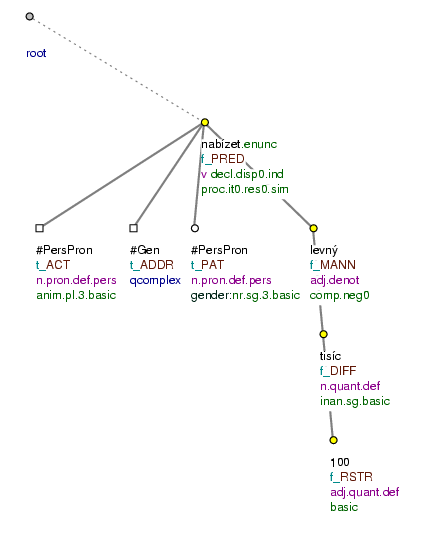- Definition of the
DIFFfunctor -
DIFF(difference) is a functor for such an adjunct that expresses manner by specifying the difference in quantity or quality between the compared events, states or entities or between the initial and final state of the event.
The DIFF functor is used for two kinds of differences:
-
difference in quantity or quality between the compared events, states or entities (w.r.t. a property).
Examples:
Nabízejí ho o 100 tisíc.
DIFFlevněji. (=They offer it cheaper by 100 thousand) Fig. 7.35Pavel je o 2 cm.
DIFFvětší než já. (=Pavel is taller than me by 2 cm)V českolipské ulici Jiřího z Poděbrad bylo najednou o něco.
DIFFvíce kyslíku. (=Suddenly, there was a bit more oxygen...)V osmi letech jsem se chtěl vyrovnat o dvanáct let.
DIFFstaršímu bráchovi. (=...a twelve years older brother)Není nikterak naší zásluhou, že jsme o půl.
DIFFstoletí moudřejší. (=...we are wiser by half a century)Slavné operní hvězdy se u nás objevily o dva roky.
DIFFpozději než komety pop music. (=The famous opera singers emerged two years later than the pop stars)In this meaning, the
DIFFmodification modifies an adjective or adverb in comparative. -
difference in quantity or quality between the initial and final state of the event (with verbs of change).
Examples:
Výroba se zvýšila o 10 procent.
DIFF(=The production was increased by 10 per cent)Počet pracovníků klesl o šestinu.
DIFF(=The number of workers was reduced by one sixth)Zdražili ceny paliva o 50 haléřů.
DIFF(=The fuel prizes went up by 50 heller)Stavba byla předimenzována až o sto procent.
DIFF(=The building was designed too large - by almost 100 per cent)Překročili plán o 200 000 korun.
DIFF(=They exceeded the plan by 200 000 crowns)Ustoupil o krok.
DIFFdozadu. (=He stepped one step back)Odsunuli dovolenou o rok.
DIFF(=They put off their holiday until next year)In this meaning, the
DIFFmodification modifies a verb.
Forms. The basic forms of the DIFF modification are:
-
prepositional phrase.
The most common forms:
o+4 Tuzemský výrobce dodal hlavy o čtyři dny později. (=The producer delivered the heads four days later)
Dependent clause. DIFF modifications can only be expressed by a dependent clause with the help of a supporting expression; e.g.:
Návštěva byla o to zajímavější, že na letecký průmysl dolehla.DIFF krize. (=The visit was all the more interesting because of the fact that...)
Specific forms. The following constructions are special cases of DIFF modification:
-
constructions with čím - tím.
For example: Čím je víno starší, tím je lepší. (=The older the wine, the better it is)
-
constructions with čím dál tím + comparative.
For example: Mají čím dál víc prostředků. (=They have more and more money)
-
constructions with tím + comparative.
For example: Tím méně jsou dějiny dílem několika intelektuálů. (=Even less is history work of a couple of intellectuals)
This type of construction is discussed in Section 5, "Specific constructions with the meaning of "difference"".
Agreeing form of an adjective. With event nouns (ending with -ní or tí; see Section 2.4.3.3, "Functors assigned to the non-valency modifications of nouns referring to events"), the DIFF modification can also be expressed by an agreeing adjective form.
Example:
centimetrové.DIFF zlepšení nejlepšího výkonu (=lit. centimeter.adj improving (of) best performance)
Figure 7.35. The DIFF functor

Nabízejí ho o 100 tisíc levněji. (=lit. (They) offer it by 100 thousand cheaper)
Border with the EXT functor. Semantically, the DIFF functor is very close to the EXT functor (see Section 6.5, "EXT"). Cf.:
-
Ustoupil trochu.
EXT(=He stepped back a bit)Ustoupil krok.
EXTstranou. (=He made one step aside/stepped one step aside)Popojít kousek.
EXT(=to make a couple of steps/walk a short distance) -
Ustoupil o trochu.
DIFF(=He stepped back a bit)Ustoupil o krok.
DIFFstranou. (=He made one step aside/stepped one step aside)Popojít o kousek.
DIFF(=to make a couple of steps/walk a short distance)
It seems that under certain conditions the adverb and the prepostitional phrase o+4 are synonymous. However, this is not always the case. The prepostional phrase o+4 cannot be used with verbs that do not explicitely express a change between the initial and final state. Cf.:
-
jít kilometr.
EXT(=walk one kilometer) -
*jít o kilometr
The prepositional phrase o+4 is thus assigned a separate functor, namely DIFF, if it expresses a difference (the EXT functor is not used).
Borders with arguments. One of the issues related to the DIFF modifications with verbs of change is also their behavior w.r.t. valency. It has turned out that this type of modification (o+4) is not limited to a certain group of verbs (which is a necessary condition for a modification to be an argument; see Section 2.1.1, "Criteria for distinguishing between inner participants (arguments) and free modifications (adjuncts)"). Modifications in the form o+4 are only considered arguments (see Section 2, "Argument functors") if the difference meaning is weaker and the interpretation is closer to that of result (the EFF functor). Cf.:
-
Rozšířili firmu o velkoobchod.
EFF(=They extended the company by the wholesale)Doplnil zásoby o rýži.
EFF(=He added rice to the stock)